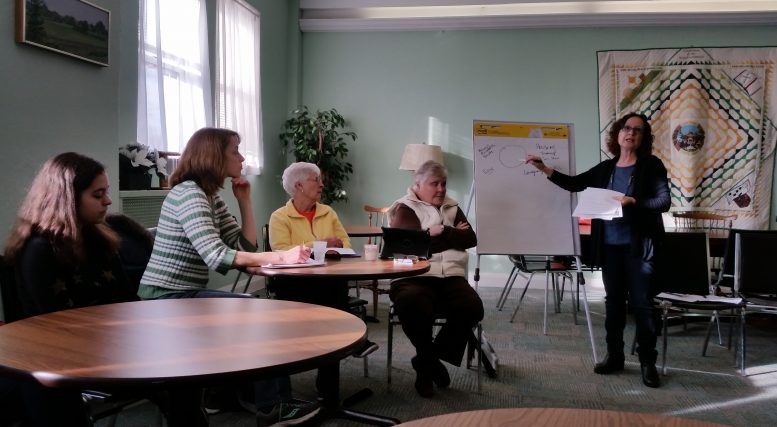By JAN LARSON McLAUGHLIN
BG Independent News
It is now less than two weeks until the DACA program is set to expire. Meanwhile, the people who came to the U.S. as small children continue to be used as a political football by politicians, according to Beatriz Maya, of the La Conexion organization in Wood County.
“It would be a miracle if they could come up with something meaningful in a few days,” Maya said Sunday as members of the La Conexion Solidarity Committee met. “We are expecting the worst.”
However, the rulings of two federal courts are keeping the DACA program on life support, explained Amanda Schackow, also of La Conexion. The court rulings are at least allowing renewals, but no one new can be added to DACA.
This has local immigrants and their advocates frustrated and fearful.
“The Republicans promised to come out with a fix for DACA. That did not happen,” Schackow said. “The Dream Act was not even a conversation.”
Ten different attempts at legislation are “floating around,” she said. “There’s no concrete piece of legislation.”
Compromise is difficult, with President Donald Trump’s insistence on a border wall, reduction in the total number of immigrants coming in, limits on family members allowed, and an end to the diversity program, Schackow said.

Amanda Schackow talks about DACA.
Since little can be done about the legislation in limbo, the La Conexion Solidarity Committee has been preparing local families for possible deportation by getting the proper documentation for the children born in the U.S. from Dreamers.
“They need to prepare for that terrible eventuality,” Schackow said.
Deportations of non-criminal undocumented immigrants have gone up 40 percent in the past year, Schackow said. According to ABLE (Advocates for Basic Legal Equality), the top trigger for deportations is traffic stops.
Ten or so states allow undocumented immigrants to obtain drivers’ licenses. But Ohio does not. Those immigrants are often turned over to ICE (Immigration and Customs Enforcement).
Undocumented immigrants are given identification numbers with the IRS, so they can pay taxes on their income – but they are not allowed to have driver’s licenses in Ohio.
“It’s a political decision,” Schackow said.
La Conexion has hosted an educational forum with ABLE about the immigration system, and has organized a rally to gather community support for immigrants. The members write letters to legislators, and have organized visits to Congressman Bob Latta’s office.
But the organization is committed to doing more than just rallies, Maya and Schackow said. They have also helped two local immigrants renew their DACA applications before the deadline last fall. Those renewal applications were $495 each. The cost of getting documentation for children varies from $30 to $1,000 depending on where they were born.
So La Conexion wants to plan some fundraisers to make sure there is money in reserve when families need documentation.
The group is also planning to push for changes at the local and state levels. “Where we’re not going to be fighting such an uphill battle,” Schackow said.
Most of the larger cities in Ohio have declared themselves as “welcoming communities” for immigrants. Bowling Green took that step last year. Gov. John Kasich came out strongly last fall in support of Dreamers, so advocates are hoping to meet with him.
“We want to make the whole state of Ohio welcoming to immigrants,” Schackow said.





